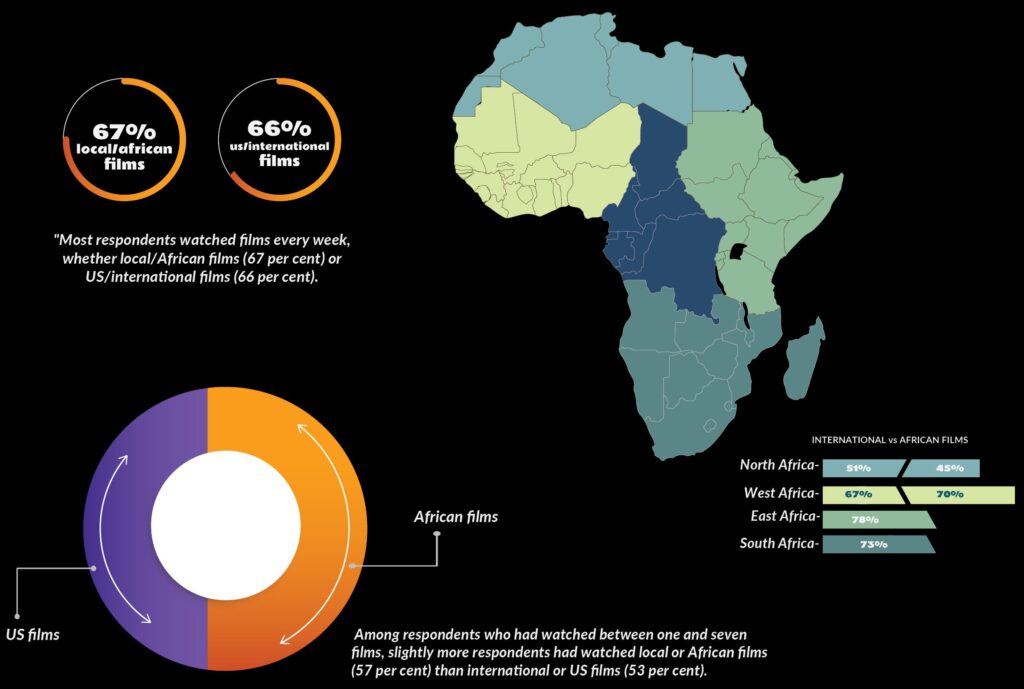African creatives are finding a new audience among the youth, who according to the latest Africa No Filter report have grown their proclivity for local content.
African media consumption shifts to local content

Local content is beginning to outcompete international films in Africa as rapid smartphone penetration and an affordable and expanding internet bring African creatives closer to people.
Seth Onyango, bird story agency
African creatives are finding a new audience among the youth, who according to the latest Africa No Filter report have grown their proclivity for local content.
The narrative change organisation’s report indicates Africans are consuming African films equally as much as the US or international content.
“Most respondents watched films every week, whether local/African films (67 per cent) or US/international films (66 per cent). Among respondents who had watched between one and seven films, slightly more respondents had watched local or African films (57 per cent) than international or US films (53 per cent),” the report reads in part.
Regionally, North Africans were the least likely to have watched a film (45 per cent) but were equally as likely to have watched local/African and US/international films (51 per cent).
West Africans were marginally more likely to have watched local/African films (70 per cent) compared to international films (67 per cent).
“International films received a marginally greater audience in East Africa (78 per cent) and Southern Africa (73 per cent) compared to local/African films. Respondents from Côte d’Ivoire were most likely to have watched a film, whether local/African (86%) or international/US (76 per cent),” Africa No Filter, a donor collaborative that supports African narratives, reports.
“Given the minor discrepancies, it seems that audiences are as interested in watching local/African films as they are in watching international ones.”
Recent studies also show that Africa’s young population is helping to drive video subscription business revenue for streaming services as content on the go shakes the African media market.
Digital TV Research’s figures now show the continent will have 13.64 million paying Subscription-Video-on-Demand (SVOD) by 2027, up from 4.90 million at end-2021.
Household SVOD subscriptions will still remain low compared to more mature markets like Europe.
Digital TV Research further shows some 6.6 per cent of TV households will pay for at least one subscription by 2027 – up from 3.9 per cent at end-2021.
International streaming services like Netflix have also taken note of the shifting trend in Africa towards local content and are now co-producing both films and reality series like the popular Young, Famous & African.
Tellingly, Netflix now has a category of “Made in Africa” and “Nollywood” which highlights how serious it conceives the African market.
While Africa’s ballooning youth population and growing middle class could represent a profitable niche for streaming services, this could also be a big opportunity for African production industries.
However, Nigerian film critic Wilfred Okiche, warns that Nollywood may, for now, have lost its shine and that the Netflix “opportunity” should be handled with care.
“For independent Nollywood filmmakers, the Netflix relationship is a lifeline to an industry badly in need of structural uplift, having hit something of a plateau with both video and theatrical, its two primary distribution models,” Okiche argues.
Netflix, Showmax, Disney, and Amazon have been studying consumer habits on the continent to appeal to its one billion-plus audience.
Netflix has about 2.6 million subscribers in Africa and wants to grow that number to 5 million by 2025. The number of people watching movies on the platform is said to be much higher, factoring in family sharing by its premium subscribers.

Netflix’s chief rival, MultiChoice’s Showmax, which has invested heavily in original African content, is beginning to reap the reward as African content now accounts for 40 per cent of its viewing.
MultiChoice is Africa’s largest pay-TV group, available in 50 African countries. Its streaming service launched in 2015 and is available in 46 African countries, as well as in Britain and France, where it targets the African diaspora.
In April this year, the streaming service said it will double its investment in creating movies and shows set in its biggest markets of Nigeria, Kenya, and South Africa.
Meanwhile, the Africa No Filter report further found that African writers are not writing for local audiences, the continent’s readership also hardly reads for pleasure.
Hardly any respondents had also read a book in the month before the interview; 75 per cent with 71 per cent had not read any African authors.
“This indicates that African authors are not attracting an African youth audience.
We also compared the respondents’ reading habits, asking how many books by African and/or international authors they had read for pleasure over the last month,” Africa No Filter notes.
bird story agency

